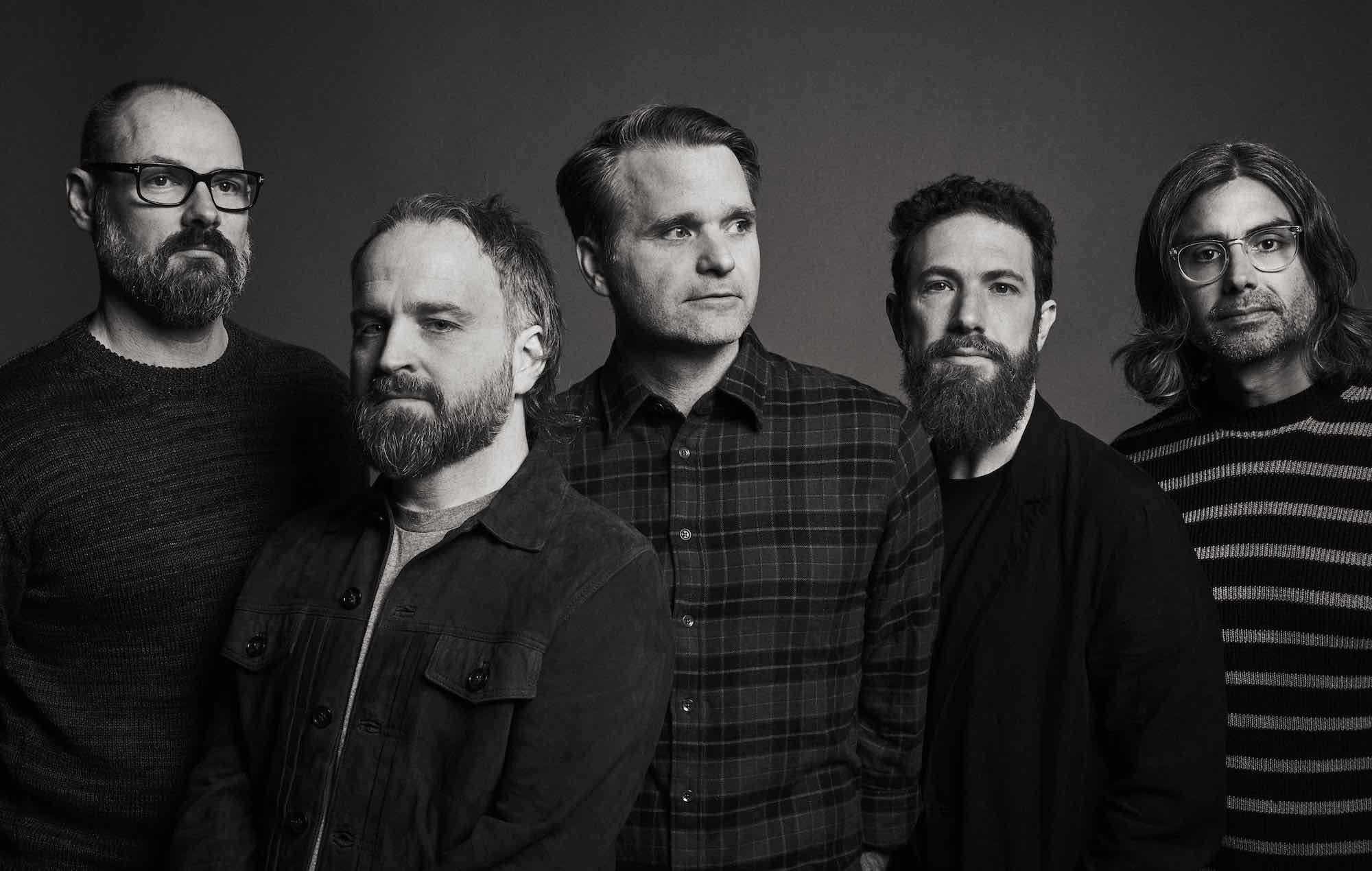
Death Cab For Cutie on their new album ‘Asphalt Meadows’: “This feels like a new band”
Death Cab For Cutie frontman Ben Gibbard has told NME about how the creation of the band’s upcoming tenth album ‘Asphalt Meadows’ made them “feel like a new band”, while also revealing that one of the album’s tracks took 25 years to complete.
The band are releasing their follow-up to 2018’s ‘Thank You For Today’ this Friday (September 16) via Atlantic, and so far it has been previewed by the singles ‘Foxglove Through The Clearcut’, ‘Roman Candles’ and ‘Here To Forever’.
- READ MORE: Ben Gibbard on his new Fender signature guitar – and how it’s influencing the new Death Cab For Cutie album
Work on what would become ‘Asphalt Meadows’ began prior to the pandemic, but Gibbard told NME that the opportunity that was given to the band to “get off the touring treadmill” during the COVID lockdowns changed the album they were making for the better.
“I remember specifically saying to my wife, at some point in January 2020, ‘I just wish I had a year off’,” the singer recalled. “The band had intermittent things planned that year, but there were a couple of own goals I had [made] too. I booked a two-and-a-half week solo tour for virtually no reason other than just to do it, and social things started to really eat away at the year.
“So the very dim silver lining on such a terrible period is that it did give artists a lot of time to take a breath and get off the touring treadmill. That time definitely took me to some different places creatively that maybe I wouldn’t have otherwise. I certainly don’t think we would have had the record that we have, I think for better, without this period.”
After living in what he called a “liminal” space between pre-pandemic life and the experience of lockdown, Gibbard told NME that “as [lockdown] extended longer my anxiety started to grow, and I didn’t really feel like writing”.
During that time Gibbard launched his ‘Live From Home’ livestream series, where he played songs from his own projects (as well as Beatles covers) in shows that were broadcast at the same time every day. Over the duration of the series, Gibbard raised over £200,000 for local COVID relief organisations in the Seattle area, as well as refreshing and revitalising his own creative process.
“I was just feeling so anxious and watching too much news,” Gibbard told NME of his headspace in the early pandemic before ‘Live From Home’ began. “I started doing these shows for altruistic reasons and because I thought people might enjoy them, but I had a selfish reason to doing them, too.
“It gave me a sense of schedule and a sense of normalcy. During a time where nobody had to be anywhere, the fact that I had to be somewhere at 4pm every day – and that I gave myself the task of playing very different sets every day and making sure that I was touching a lot of material – gave me a real sense of purpose in that time when I felt like I was floating.”
Through playing old Death Cab material and covering artists who inspired him during the series, Gibbard gained a new perspective when looking to write what would become ‘Asphalt Meadows’. “For anybody who has been doing this as long as we have, there’s this delicate balance that you’re always trying to strike between the spirit and the sonics of some of the older material, while also trying to push in some new directions. But I also wanted the record to sound like Death Cab – I want us to sound like us.
“In revisiting a lot of the older material for those shows,” he added, “it gave me some newfound perspective, or a perspective I hadn’t really had in a while. I would say, ‘I really like this tune, maybe we should start playing it again’. Or, ‘Oh, this song has a cool twist in it. Maybe I should try to do something similar to that on a new song’. It just allowed me to be a little more full-circle when thinking about our catalogue.”

Death Cab worked on ‘Asphalt Meadows’ with producer John Congleton, who Gibbard said he “immediately fell in love with” having been introduced by the band’s keyboardist Zac Rae in summer 2021. “John was somebody we’d always been kicking around about doing a record with,” Gibbard told NME, saying that the band were “quite far down the road” with making ‘Asphalt Meadows’ with an unnamed British producer before “COVID and creative differences slowed down that idea”.
Meeting with Congleton while he was in Seattle working with Tegan and Sara, Gibbard said the pair struck up an immediate friendship: “One of those fast friendships where you’re just kind of finishing each other’s sentences. I was just immediately completely taken with John. Sometimes the path you start on doesn’t end up being the path you take, but the path that you do take ends up being a far better one than your original plan. And that was certainly the case when working with John.”
As well as changing producers, Gibbard also set himself and his bandmates a challenge when writing the album. “When I was writing early in lockdown, I felt like I was repeating myself a lot,” he explained. “My hands were going to similar places on instruments, and I just wanted to break out of the lyrical holes that I was falling into.”
To break out of this rut, Gibbard came up with an MO for the record, where at the start of every week the band would pick out each of the five members’ names in a random order. From there, the member assigned to Monday would create a piece of music, which they would then pass on to the next member for Tuesday, and so on.
“By Friday,” Gibbard explained, “we’ve all had 24 hours with the song to do our bit, and when you had the piece of music you had complete editorial control. If it got to Dave [Depper, guitarist] on Wednesday, and he didn’t like the tempo, or he didn’t like the drum bit, he could just take it away or make something new. The goal was that we wanted to try and write the best songs possible. It wasn’t a case of everybody individually saying, ‘I’m going to shine with my cool guitar part on this one day!’ Everything was very deliberate in a way that we’ve never done before.”
Through this new process of working, Gibbard told NME that he learned more about his bandmates and that Death Cab now “feels like a new band” to him: “It feels like we’re just starting to tap the potential of this particular line-up.”
The anchor of the record is their stunning recent single ‘Foxglove From The Clearcut’, a post-rock-influenced hammer blow that began life over 25 years ago. Gibbard explained that, before the pandemic, he found and uploaded to his computer a host of four-track master tapes that he had recorded between 1996 and 2002, stumbling upon an unfinished instrumental track from ‘98.
“I was like, ‘That’s kinda cool actually!’,” he recalled to NME. “I made a loop of the drum, bass and guitar parts that I had recorded for it. It had a very ‘90s indie rock vibe to it. I thought to myself, ‘I’m just gonna try talking over this. I’ve never done a song where there’s been a spoken-word narrative’. One of the reasons that this song feels like such a tentpole for the record is that it’s quite literally the synthesis of the origins of this band and where we are now. If you’re trying to kind of harness the sonics of where you started and where you are now, that was just a perfect happy accident where those things can exist together.”
Of the song’s impact on him and ‘Asphalt Meadows’ at large, Gibbard added: “There really is no more introspective way to create music than to finish a thought you’d had 25 years ago. It’s literally finishing a thought. I remember when I was having memories of writing this piece of music, and I’d just sit in my house in Bellingham with a four-track and some shitty mics. I remember being disappointed that I never did anything with that, because I really liked that.”
In the song, Gibbard’s spoken-word performance positions him as the narrator telling the story of a man “who used to live by the ocean but never set foot in the sea”. After completing the song, the frontman realised that, in fact, he was both narrator and protagonist.
“When I’m writing, the characters are usually pretty flushed out, and I can see their faces,” Gibbard told NME. “But with ‘Foxglove’, I literally saw myself as the narrator standing next to somebody, but that person’s face was blurred out. I know this is very esoteric, but in my mind’s eye writing that song I was like, ‘Oh, there’s a person I’m writing about, and they’re all backlit or blurry, I can’t see who they are’.

“Then,” he added, “I started to realise that it’s definitely me. Perhaps it’s because of the gap between the beginning of this composition and now, there was me at two different places in my life and I was speaking to myself after I’d had a long journey.”
Through unconscious revelations like these and deliberate attempts to shake up their creative writing process, mystical magic flowed through the creation of ‘Asphalt Meadows’ that can be keenly felt across the record.
“The longer you do this, you’re going to hit a point where you’re starting to either repeat yourself or write yourself into a corner,” Gibbard said. “You have some songs that you’re very proud of, but you think, ‘Jeez, I don’t know what else I have to say!’
“These moments of creative transcendence become fewer and far between, but when they do happen, it’s an incredibly powerful and life-affirming moment. You think, ‘I love that I do this for a living. I love that. This song took 25 years to get to me. That’s fucking beautiful, you know’.”
Death Cab For Cutie will tour the UK and Europe in spring 2023. See the full list of gigs below, and find tickets here.
JUNE 2023
1 – Fabrique, Milan
2 – X-Tra, Zurich
5 – Den Grå Hal, Copenhagen
6 – Filadelfia, Stockholm
7 – Sentrum Scene, Oslo
9 – Columbiahalle, Berlin
10 – 13, Tilburg
11 – Paridiso, Amsterdam
12 – E-Werk, Cologne
14 – De Roma, Antwerp
15 – Atelier, Luxembourg
16 – Salle Pleyel, Paris
18 – Rock City, Nottingham
19 – Bord Gais Theatre, Dublin
21 – O2 Institute, Birmingham
22 – Usher Hall, Edinburgh
23 – Barrowland Ballroom, Glasgow
25 – Apollo, Manchester
27 – Dome, Brighton
29 – Royal Albert Hall, London



